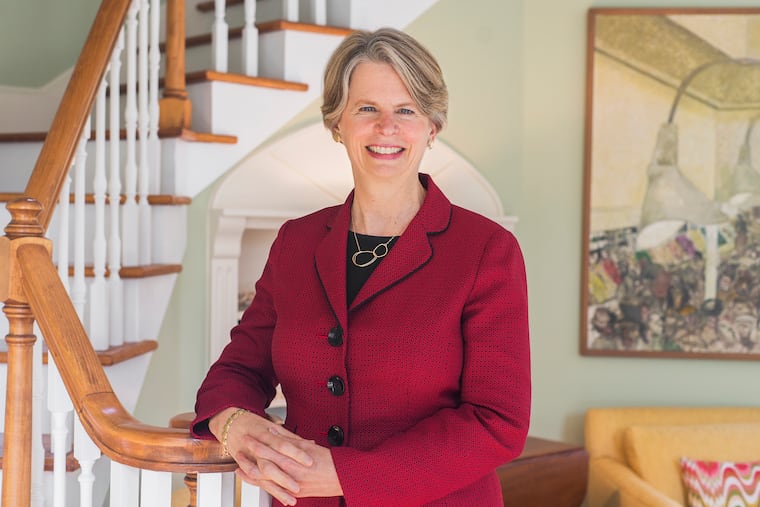With ‘grace and invitation,’ Haverford’s new president has much to teach
Wendy Raymond, vice president for academic affairs and dean of faculty at Davidson College in North Carolina, will become Haverford College's 16th president on July 1.

Wendy Raymond, then a young faculty member at Williams College in Massachusetts, wasn’t getting the kind of evaluations from students that she had hoped.
She was competent and knowledgeable, and knew all her students’ names. But she was very serious and rarely smiled.
Then she got advice from a Harvard consultant who watched video of her teaching a genetics course: Approach the classroom and students with “grace and invitation.”
“Instead of being someone who has lots of information and ways of knowing and was ready to impart that,” Raymond recalled, “I really needed to be openhearted and invite them in. My tone and my approach totally changed.”
So did her evaluations.
It’s something Raymond, decades later, still talks to young faculty about. It’s a lesson that never grows old, and it’s one that she soon may deliver firsthand at Haverford College.
Raymond, now vice president for academic affairs and dean of faculty at Davidson College in North Carolina, was named the new president of Haverford on Friday.
She will take the post July 1, replacing Kim Benston, an English professor who served for four years and will return to teaching.
“I’ve always been attracted to Haverford because of its values,” said Raymond, 58, who spent her academic career at two similar, highly selective small liberal arts colleges – first Williams, then Davidson.
She cited the focus on integrity, the importance of community, and the school’s honor code.
She becomes the first permanent female president at the 1,350-student college on the Main Line. (Joanne Creighton served as interim president from 2011 to 2013 in the wake of the departure of Stephen G. Emerson.)
As a molecular biologist, Raymond said, “I’ve come up in a world where there were very few women in my field. I’m quite accustomed to a lot of the challenges that come with those territories. I feel as though I’m as ready for it as possible.”
She has been a champion for inclusion and equity in the sciences, and served on, as well as chaired, a committee at the National Science Foundation that advised Congress on the progress of inclusion of women and other underrepresented groups in science, technology, engineering, and math fields.
“We as a nation have not made the kind of progress that we would like to be making in terms of inclusion,” she said.
At Davidson, she fostered interdisciplinary learning, supported and recruited strong faculty and helped create a more inclusive community, according to the president of Davidson, Carol Quillen.
“She helped build an environment where our entire community works together to see beyond the well-traveled path,” Quillen said in a statement.
A native of Mequon, Wis., Raymond got her bachelor’s degree in chemistry from Cornell University and a doctorate in biochemistry and molecular biology at Harvard.
She did her postdoctoral work in genetics at the University of Washington, and then was hired by Williams in 1994, where she worked for nearly 20 years, before joining Davidson in 2013.
She’s married to David Backus, a geologist, who is also a 1982 graduate of Haverford; the couple have a son, Caleb, 23.
At Haverford, Raymond will help the college with a new strategic plan and then launch a fundraising campaign to pay for the initiatives.
And though she doesn’t plan to teach, she’ll likely share what she’s learned from it, including the lesson she got from the Harvard consultant all those years ago. She discussed her transformation as a teacher in detail in a meeting with faculty at Davidson early on during her tenure there. The talk was taped and appears on Vimeo.
She also shared during that talk how she learned to become more conversational in class by pretending one of her closest friends and colleagues was sitting there as one of the students.
After that, her student evaluations were excellent, she said.
“More importantly, students thrived and loved genetics,” she said this week.
“I now understand that in telling newer teachers those two words – grace and invitation – they are also invited into this endeavor of continuing to open up minds to discovery and risk-taking and reflection and creativity. That just became my way of being now as a faculty member.”
She’s got a lesson for students, too, the ones who lament getting a grade as low as 75 on a test. In graduate school, she scored 19 out of 100 on a test in one class and a 21 on a test in another.
“The point is, what do you do when you get a 19?” she said. “Do you persevere? Do you seek assistance?”
She talked to her adviser, who suggested she drop one of the courses, focus on the other courses, and then make up the course she dropped the next year.
She did. And it worked.
Fast forward a few decades, Raymond is no longer a grad student having a struggling moment, but an esteemed academic soon to take on a job as one of the nation’s newest college presidents.